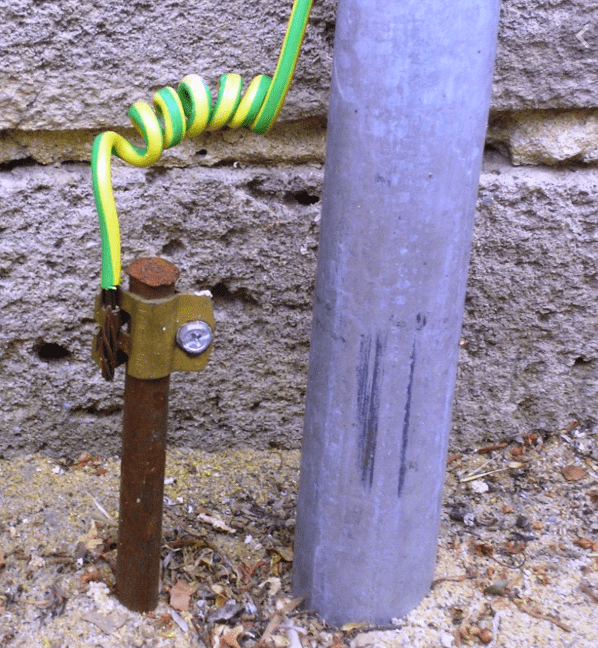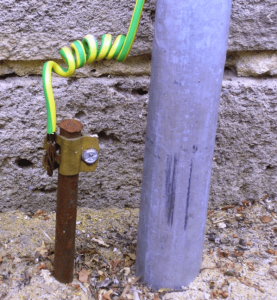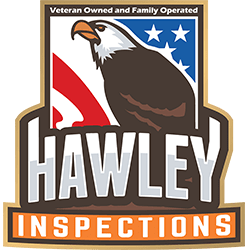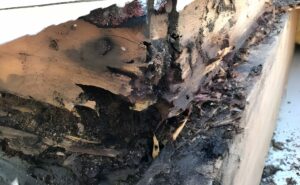
Grounding and Bonding for Detached Buildings – December 5, 2018
Grounding and bonding are required, except for outbuildings containing only one 120 volt grounded branch circuit. Electric systems at detached buildings require bonding and a separate grounding electrode system (GES), which is

commonly a grounding electrode (ground rod) in our area. See attachment for wiring illustration. One illustrates a three-wire feeder, and one shows a four-wire feed.
Service Panels
When inspecting the service panel (main breaker/fuse box), you must determine that it is the first disconnect in the system downstream from the meter. There are two standard exceptions.
The first would be in rural systems where the meter and a service panel/disconnect are located on a pole and not the house or shed and are more than ten feet apart.
Second, the meter and inside breaker panel may be separated by a considerable distance (usually 10 feet or more) with a disconnect located directly below or close to the meter.
The second is most often found in duplexes and apartments but may also result from adding a garage or room addition and moving the meter but not the breaker box. A disconnect should be located near the meter in this case. Make sure the service wires to the remote are in conduit.
Grounding and Bonding for Remote or Sub Panels
In both of the above cases, what most people would refer to as the main breaker panel is a “remote panel” (please use remote, not “sub-panel”). If the wires feeding the remote panel are H H N G, it is a four-wire feed. And the neutrals must be isolated and grounds separated and bonded to the panel body. This was changed in the 2008 NEC.
A three-wire remote panel is handled the same as a service panel with grounds and neutrals allowed on the neutral bus. (Otherwise, there is no connection to the ground circuit).
In this case, the neutral bus containing both neutrals and ground wires would be bonded to the panel body. We recommend upgrading a three-wire system to a four-wire system for safety.
To be clear, ground rods do not provide ground fault clearance for the breakers. The earth ground will only allow about 4.8 amps to flow to the ground at 120 volts, and this will only energize the ground wire but will not trip a breaker. The ground rod is to help dissipate electricity overloads from lightning strikes and power surges.
Grounding and Bonding Requirements
The National Electrical Code sets grounding and bonding requirements. However, there are many acceptable grounding options, including metallic water pipes, driven ground rods, buried ground rings, and rebar in a foundation. The local code officials must approve each method due to the country’s different soil types and moisture contents.
Three-wire feeds were allowed by the National Electrical Code until the 2008 edition. The NEC, as with all codes, is constantly changing as new problems and solutions are reviewed. Many municipalities do not adopt the current code (new) for several reasons.
It is common practice for the authority having jurisdiction (AJH) to wait and see if the new changes to a code are revised, removed, modified, or generally accepted by other jurisdictions. This may mean the local AHJ may be three to twelve years behind the current code cycle.
Code changes usually only apply to new construction and remodeling work that requires a permit, with a few exceptions.
We recommend reviewing any electrical issue with a qualified electrical contractor. Many issues are involved in upgrading an electrical system. Homeowners must weigh the benefits gained against the costs incured.
Some changes are relatively inexpensive and can have a substantial effect on safety and efficiency. Others may require extensive demolition and reconstruction with little if any improvement in safety or efficiency.
The other issue is whether the local code enforcement officials (AHJ) will require the upgrade. The National Electrical Code is only a standard put out for everyone to use. The enforcement of the code is up to the city, township, county, or state you live in.
Safety is always a top priority when dealing with electricity because it does not care where it goes or how it gets there. Nor does it care if it gets there by way of human contact. We will never be able to make electricity completely safe but upgrading to current code standards when possible will go a long way towards saving lives and property.
For more information on our warranties
Warranty
Check us out at the Better Business Bureau




